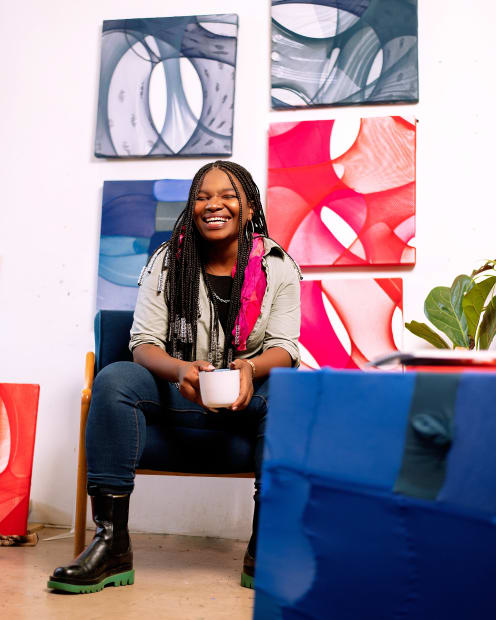-
Turiya Magadlela brings her deeply personal and socially resonant work to this solo exhibition titled Uchazwa yini, what’s your fascination? Magadlela invites viewers to turn inward and consider: yini ekuchazayo nawe? What fascinates you at this moment? Using her iconic pantyhose works as a point of departure, she skillfully navigates modes of revealing and concealing, pointing to unveiling and undressing as markers of intimacy, vulnerability and strength.With a background in painting and sculpture, Magadlela’s practice is defined by a distinct narrative exploration, often grounded in the socio-political tensions of post-apartheid South Africa. Her early works, created in response to the dehumanizing effects of apartheid, were striking monochrome compositions reflecting the controlled roles of labor in society. This foundation expanded into more complex material explorations after a formative period in Europe, where she began experimenting with unconventional materials like pantyhose. This fabric, laden with metaphor, became central to her practice, symbolizing both fragility and strength, and enabling her to weave stories of identity, struggle, and resilience.In this exhibition, Magadlela presents new works that incorporate painting into her established material language, continuing her investigation of inequality and power dynamics while exploring cultural history and personal experience. Each piece is meticulously crafted by hand, with every tear and stitch imbued with meaning, offering both a continuation of her pantyhose series and a bold expansion into new artistic forms.
-
"I’m a painter and sculptor, I see my creations as objects that tell stories of curiosity—an exploration of the many fascinations that drive my work.My artistic approach began during my third year of study (WITS tech, led by David Paton, Mark Edward, Bonny Alice, Leora Farber) in year 2000 with artists Carol Slabolesky, Maria Paola d’ Andrea, Nicolas Hlobo, and in junior and senior classes where Lawrence and Mary Sibande, Davi Tlale was doing fashion or engineering not sure he was a senior.In 2001, a time of transition out of formal apartheid that left me questioning the world around me. I was struck by how the system reduced intelligent individuals to mere laborers. This led me to create monochrome square compositions in colors representing different types of labor— blue, yellow, and orange. I titled these pieces “Composition in Red or Blue I,” - reflecting the control imposed by apartheid structures. It infuriated me and I’m not surprised at the sudden uprising against the law by common people in our society.
-
After a period in Europe, where I experimented with white compositions using plaster of Paris, I returned to South Africa in 2008 feeling disconnected from the art scene. Frustrated yet determined, I started the pantyhose series, motivated by story telling, humanity and the absence of them in apparel that they once invaded, similar to the overall series, I created everybody knows UFeela parallel to the kaffersheet series, a fascination about the question “how did we as a people get here?” I also wanted to reintegrate into the art community; During this time, I worked with Neil Dundas and Linda Givon, and later with Ralf Seippel, while gradually becoming involved with the Nedbank Art Collection under the guidance of Willem Kruger and Rochelle Keene. This experience enriched my practice over a decade, allowing me to re define my art using various techniques with paint, fabric, and chemicals… playing with compositions and re discovering myself
The work, such as iKapa lodumo ne Zinto ZA yo; ne nyaniso, emerge from themes of inequality, which is the title of the ongoing series with similar compositions; while other series like incosi ye ngamla, failed ballet dancer, and khala colour color help me catalog my artistic inventory. Each piece is unique—crafted by hand, with every tear, stitch, and mark telling its own story."I look forward to sharing my work and continuing this journey with you, as I strive to push the boundaries of contemporary African art and inspire future generations.- Turiya Magadlela -

Uchazwa yini : Turiya Magadlela
Past viewing_room

